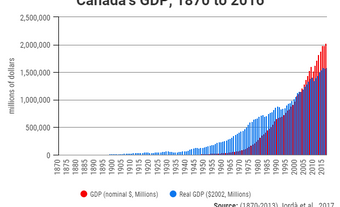Economic Forecasting
Economic forecasting is the projection or estimation of statistical measures of the performance of a country, group of countries, industry, firm or community. Concepts forecasted are often standard measures of economic or business results such as production, employment, prices, incomes, spending, sales, profits and other similar statistics. Forecasts can be high frequency and short term (eg, monthly for one year) or low frequency and long term (eg, annual and for decades). Forecasts are prepared by specialist firms and institutes as well as businesses, government departments and utilities. Many Canadian groups prepare detailed forecasts for the nation, the provinces, individual industries, utilities and companies.
Executives and senior managers use forecasts as a part of planning and investment decisions. For example, manufacturers might use them for staffing, inventory and material purchases. Utilities use projections to decide how much production capacity will be needed. Governments use industry- and economy-wide forecasts to anticipate revenues and expenses for budgeting purposes. Financial institutions use projections for anticipating demands for services and to gauge the future performance of markets.
Forecasters rely on a large variety of techniques. Simple methods involve informal extrapolations of recent trends. More sophisticated methods use complex statistical time series analysis and econometrics (a form of statistical regression analysis). Most forecasts involve a combination of computer analysis, mathematical rigour and informal judgement by the forecasters. Often the risk associated with forecasts is simulated by preparing alternative projections that are based on different assumptions. Forecast accuracy is measured by a variety of accepted measures, and independent outside observers often evaluate the relative accuracy of different projections.
Critics of forecasting argue the future is largely unknown and that projections often give a false sense of security. Large forecast errors and structural flaws or inconsistencies in methods are revealed as weaknesses.

 Share on Facebook
Share on Facebook Share on X
Share on X Share by Email
Share by Email Share on Google Classroom
Share on Google Classroom

